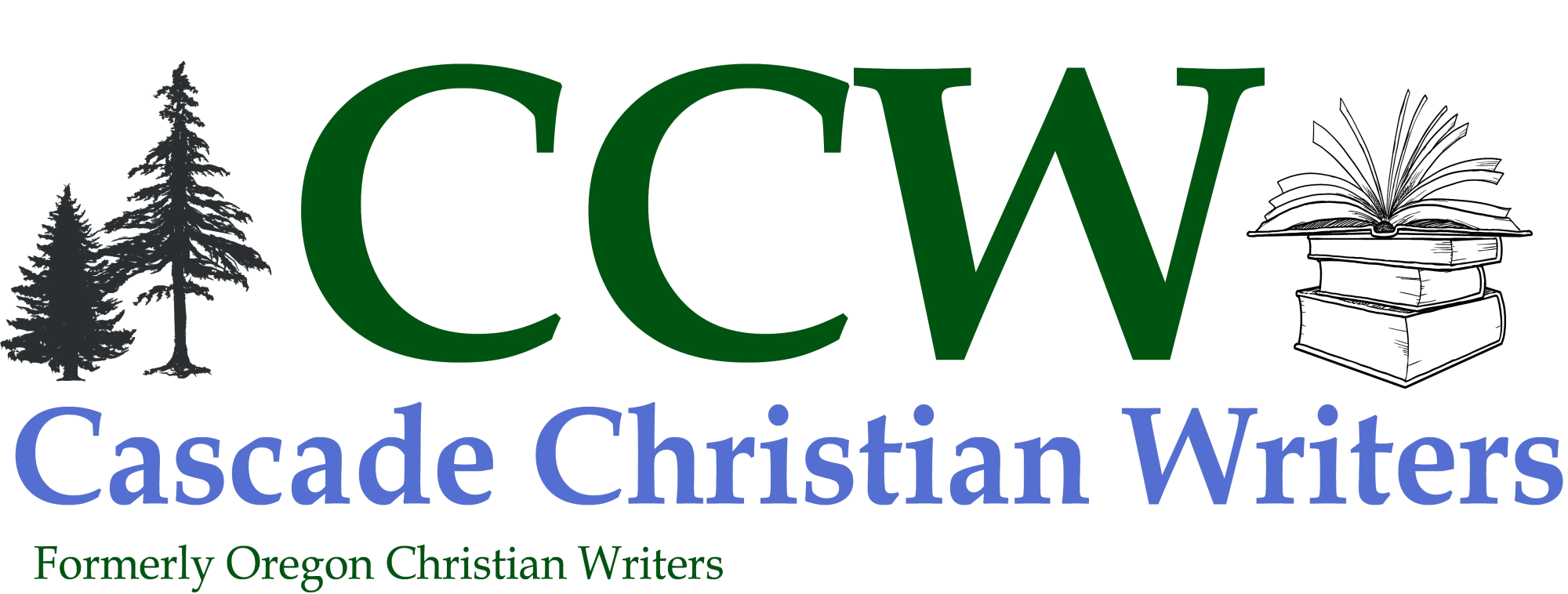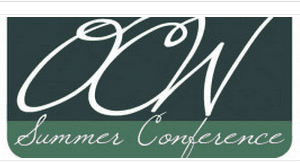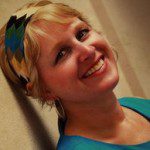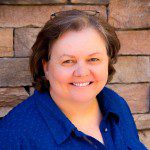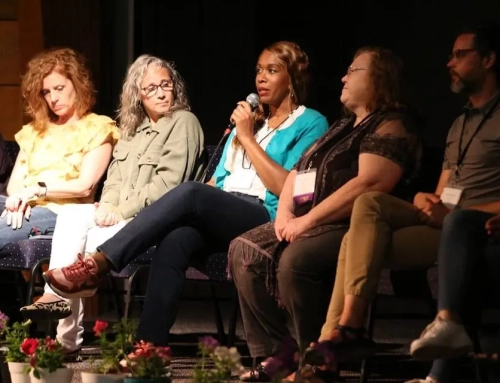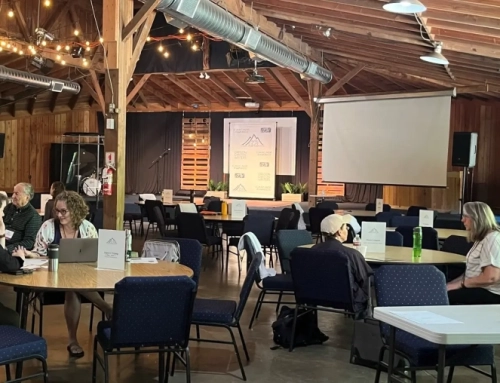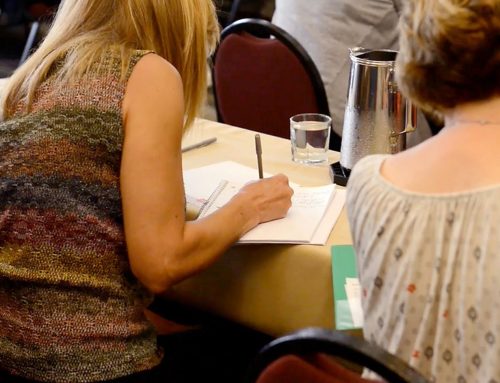OCW is pleased to offer 10 coaching classes for this year’s Summer Conference, as well as a very special new addition! Mark your calendars today!
Premium Intensive Coaching Class—$50 additional charge
“Get Published; Stay Published: Advanced Teaching for Career-Minded Novelists” with James L. Rubart, and Susan May Warren
(Fiction Intermediate to Advanced, for those who have completed a manuscript) Limit: 30
Are you an advanced writer, nearly published, or just published, struggling to get to the next level on your journey? Perhaps you’ve published before . . . but your current proposals aren’t quite finding a home.
Designed to tackle those individual challenges, this OCW-only premium class is for those hard-working, select few who want to dig into every area of their writing career and send it soaring. Taught by three nationally acclaimed teachers: award-winning, best-selling authors James L. Rubart and Susan May Warren. Students will have the first 10 pages of their manuscript evaluated before the conference, then be assigned to one of three small groups to work with Jim or Susie during the conference.
In addition, this premium class will cover:
The Building Blocks of Great Fiction
- Creating a Story That Changes Lives
- The Story Equation—Unlocking your story from the inside-out
Writing Craftsmanship
- Advanced Story Essentials—Learn how to show versus tell, understand scene tension, and build in symbolism for powerful storytelling
- First 50 pages—Editing yourself into publication
Publishing/Marketing
- The Psychology of the Reader—How to get into a reader’s head and create a “must-read” book
- Brand Building/Igniting Rabid Fans and Creating a Book Launch
Inspiration
- Capstone—Why Do You Write?
Included in this Premium class: a downloadable workbook, small group discussion/homework for feedback, and preconference manuscript excerpt evaluation. The goal is to help you Get Published and Stay Published—to build your writing career.
Participants will fill out a questionnaire to determine the best match for their small group coach. Instructions for sending synopses and first 10 pages of manuscripts will be sent in early July.
James L. Rubart is the best-selling and Christy award-winning author of six novels. His novels have been nominated for three Carol Awards, two Christy awards, and his novel Rooms won the Romantic Times Book Reviews Inspirational Novel of the Year as well as a USA Book of the Year Award. In 2013, his novel Soul’s Gate won both Christy and INSPY awards. www.JamesLRubart.com
Susan May Warren is the Christy, RITA, and Carol award-winning author of more than 45 novels with Tyndale, Barbour, Steeple Hill, and Summerside Press. Two-time Christy winner and a RITA winner, she’s also a multi-winner of the Inspirational Readers Choice Award and the Carol Award. She also wrote the book Conversations with a Writing Coach in addition to other helpful books for novelists. www.mybooktherapy.com
“Middle Grade and Young Adult Novels That Sell” with Sally Apokedak
(Youth Fiction)
When I open queries, I am looking for characters to love. In this class, aimed at experienced writers who haven’t yet been able to break out with big sales, we’ll discuss four elements that help you showcase your characters and invite readers to fall in love. We’ll look at world building and fresh premise with plot twist, theme, and voice.
Participants will send a two-sentence pitch, a two-paragraph pitch, and the first page of their manuscript (250 words) in advance so we can discuss the stories in class. If the material is not submitted by July 31, writers may still take the class, but we won’t be able look at any material that comes in late.
Sally Apokedak is an associate agent with the Leslie H. Stobbe Literary Agency. She’s been studying, reviewing, and marketing children’s books as well as teaching writing for a dozen years. She is the YA contributor to Novel Rocket and teaches at writers’ conferences across the country. http://www.sally-apokedak.com
“Taming the Most Common Fiction Dragons” with Karen Ball
(Fiction, New writers to intermediate: limited to 10 students)
Want to take your manuscript to the next level? Join an experienced editor and agent in this intensive mentoring class, geared to those new to writing fiction or who may have already published a novel. Students will have an opportunity to exchange work for review before the conference.
“Dragons” like POV (point of view), voice, and their cousins are lurking in the shadows, bent on destroying your fiction. But you don’t have to fear them! In this interactive class, you will learn to identify these detrimental dragons. From show vs. tell to voice, point of view to dialogue, and much more. You will leave this coaching class ready to take on—and take out!—the dragons. Bring your work-in-progress.
Karen Ball is a literary agent with The Steve Laube Agency and a best-selling, award-winning author. As an editor, Karen built and led fiction lines for Tyndale, Multnomah, Zondervan, and B&H Publishing Group. She has acquired and worked with some top novelists, including Francine Rivers, Karen Kingsbury, Brandilyn Collins, Angela Hunt, Ginny Yttrup, and Robin Jones Gunn. www.stevelaube.com
“Weaving Story Threads in Fiction” with Jane Kirkpatrick
(Fiction, Intermediate)
“Weaving Story Threads” will explore the work you need to do before writing, including how to create authentic characters at home in their landscape, time period, relationships, spirituality, and work lives. The class will also involve discussion of “the work before the work,” Jane’s writing practices, and strategies that bind story and meaning in her 22 fiction titles. Expect to feel safe, respected, and have fun—prerequisites for a healthy learning environment.
Jane Kirkpatrick is the New York Times best-selling author of 26 books, including 22 historical novels based on actual women. She has spoken internationally; won the Wrangler, Carol, and WILLA awards; and finaled for the Oregon Book Award, Christy, and other awards. http://www.jkbooks.com/
“Crafting Bible Studies for Spiritual Growth” with Terri Kalfas
(Nonfiction)
Have you ever thought about publishing a Bible study? Maybe you have an idea but don’t know exactly what to do with it. Maybe you’re already writing and teaching Bible studies for your church or small group. How do you take the next step—publication? You don’t need a doctorate in theology to write a Bible study, but you do need to know certain things before you pitch it to a publisher.
In this coaching class we’ll discuss the changing market and how today’s cultural influences impact your audience—how participants have changed and how that has changed Bible study itself. We’ll also discuss the various types of studies, specific differences between curricula and Bible study guides, who publishes what, the basics you need to know about learning styles and stages, how to use illustrations, how to craft good questions, branding and whether you need to be concerned with it, what editors look for when considering an author and manuscript, and, most important, Jesus’ pattern for teaching.
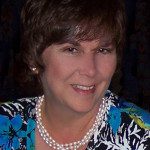 Terri Kalfas is the acquisition editor for Grace Publishing, which publishes biblically based resources that challenge, encourage, teach, equip, and entertain Christians of all ages. www.grace-publishing.com
Terri Kalfas is the acquisition editor for Grace Publishing, which publishes biblically based resources that challenge, encourage, teach, equip, and entertain Christians of all ages. www.grace-publishing.com
“How to Become a Best-Selling Author with Your First Credit (or How to Write for Magazines)” with Susan King
(Nonfiction)
It’s not hardcover, and you’re not the only author on those pages, but when a magazine publishes your work, you reach thousands more people with your message than most books do—and with a much faster turnaround time.
This class will focus on advanced writing for any genre (or how to get editors to fall all over themselves to publish your submission and then clamor for anything you might write in the future). Specifically, we’ll look at how to analyze magazine markets and how to write query letters and feature articles. We’ll also focus on writing devotionals for a periodical that reaches millions of readers worldwide.
Susan King is an associate editor for The Upper Room. She has taught English at Lipscomb University and feature writing at Biola University and Abilene Christian University. In addition, she has been a book editor and a radio-program producer and has written magazine articles as a freelance writer. www.upperroom.org
“‘No Fear’ Book Publishing Strategies That Work!” with David Sanford
(Nonfiction)
Day 1
Would you like to receive expert advice on landing book publishing contracts? We’ll examine seven key strategies for doing just that:
1. Starting: What does it take for you to pursue book publishing successfully?
2. Sustaining: What fears do you need to overcome to publish books successfully?
3. Creating: What’s the best way to evaluate your existing “word bank”? (Get ready for a pleasant surprise!)
4. Crafting: How do you identify your most marketable book ideas?
5. Evaluating: How can you objectively evaluate your new book ideas?
6. Collaborating: Who do you need on your team to become a published author?
7. Marketing: Since great ideas aren’t enough, what else do you need to know to secure a publisher?
Day 2
Book publishers have to say “yes” to 21 strategic questions before they’ll say “yes!” to signing a publishing contract with you. Not all questions, however, are equal. Bottom line: The publisher has to decide “yes!” so they’ll love working with you. The three doors to landing a book contract can open quickly if you find and use the right keys. Learn the “golden keys” for book-publishing success.
Day 3
We will examine current market realities within the world of book publishing. Discover the pros and cons of all five viable avenues for publishing your book(s). More importantly, learn “no fear” strategies for pitching your proposals to top prospective publishers (or literary agents). Plus learn how to best pitch your book(s) directly to potential buyers/readers.
David Sanford is an award-winning author, editor, literary agent, and teacher. He has helped new Christian authors publish nearly 100 books with Zondervan, Tyndale House, Thomas Nelson, Strang, Regal, NavPress, Multnomah, Moody, Kregel, InterVarsity, Howard, Harvest House, Group, Cook, Crossway, B&H, Baker, Authentic, AMG, and other Christian publishers. http://www.credocommunications.net/about-us/associates/
“The Language of Screenwriting” with Nancy Ellen Dodd
(Screenwriting)
The language of a screenplay is unlike other forms of storytelling. Screenplay formatting is a code that gives the entire crew the information it needs to create a movie. However, a screenplay is read before it is seen on the screen—if the reader doesn’t see it on the page, it won’t make it to the screen. Screenwriting requires telling a story in the proper format through images and dialogue that imply what will visually be seen.
To convince someone to read your screenplay requires creating a dynamic logline that is a microcosm of your whole story. The logline is what you say to get your 30-second elevator pitch. It should also serve as the basic one-to-three sentence outline of your story.
Story mapping is a tool for developing a stronger story and finding its holes. By comparing the Aristotle/Freytag approach with “the hero’s journey,” we will see which process is a better guideline for developing your screenplay.
In this class we will work on:
- Logline
- Formatting
- Imagery/Action
- Dialogue
- Pacing
- Storytelling
Nancy Ellen Dodd teaches advanced screenwriting at Pepperdine University and is the author of the book The Writer’s Compass: From Story Map to Finished Draft in 7 Stages (Writers Digest Books). http://thewriterscompass.com
“Making a Living in Today’s Publishing Market” with Chip MacGregor
(Professional Writers’ Track—Fiction & Nonfiction)
This course is for published authors, with a focus on managing careers and staying the course. In the first session we’ll explore the trends and directions of publishing these days, including e-books, subscription services, author marketing, indie advertising, sales tools, and writing that makes money. We will also Skype with people in New York and elsewhere about the directions of the industry. In addition, we’ll involve the literary agents at the conference to talk about the new role of agents, how that fits with indie publishing, and who does and does not need an agent, And we’ll talk with some authors who have had success with indie publishing.
In the second session, we’ll bring in marketing folks to talk about what is working and what is not working in indie marketing. We’ll not only discuss social media but also what proactive marketing tools authors are using, including paid and unpaid advertisements. Participants will have an opportunity to share their marketing strategies.
In the third session, we will talk with editors at the conference about the unique directions each publisher is going, and we will Skype with editors at other houses to discuss what’s happening at CBA houses in Nashville, Colorado Springs, and Grand Rapids.
Chip MacGregor is the president of MacGregor Literary, a full-service literary agency. A former publisher with Time Warner, he has worked with authors as a literary agent for more than a dozen years and was previously a senior editor at two publishing houses. Chip is also the author of a couple dozen books and a popular teacher on the craft of writing and marketing. www.MacGregorLiterary.com
“How to Be an Insanely Great Indie Author” with Randy Ingermanson
(Marketing)
Everybody knows that some indie authors are absolutely crushing it in the marketplace, earning six figures, seven figures, and even eight figures per year. But everybody knows that those big-shot indies are just “outliers” who got really, really lucky. Right? Right??? Well, not exactly. In this class, we’ll talk about what it means to be “insanely great.” We’ll talk about the realities of the marketplace and why there can only be a few gigantic winners. But we’ll also discuss why this is the best time in history to be an author and the “success equation” that applies to all authors, whether they’re indie or traditional. We’ll see why a very few authors succeed massively, why many authors succeed pretty well, and why the great majority of authors don’t. And we’ll talk about how to climb “Mount Impossible” and earn a decent living as an indie author. We’ll see the amazing marketing tools indie authors can use that their traditionally published friends can’t, and Randy will share how he juiced his indie earnings tenfold in one year. Finally, we’ll talk about how to make a plan that gives you your best shot at success.
Randy Ingermanson is the award-winning author of six novels and three nonfiction books and a popular writing teacher. He’s known around the world as “the Snowflake Guy” in honor of his Snowflake Method of writing a novel. His Advanced Fiction Writing E-zine reaches nearly 30,000 readers. Randy has a doctorate in theoretical physics from UC Berkeley. www.ingermanson.com
